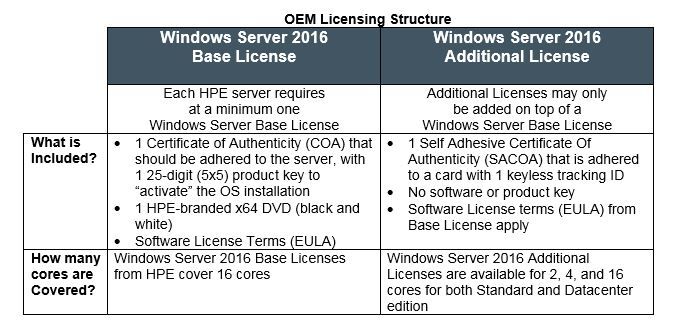- Community Home
- >
- Partner Solutions and Certifications
- >
- Alliances
- >
- Windows Server 2016 Base Licenses vs. Additional L...
Categories
Company
Local Language
Forums
Discussions
Forums
- Data Protection and Retention
- Entry Storage Systems
- Legacy
- Midrange and Enterprise Storage
- Storage Networking
- HPE Nimble Storage
Discussions
Forums
Discussions
Discussions
Discussions
Forums
Discussions
Discussion Boards
Discussion Boards
Discussion Boards
Discussion Boards
- BladeSystem Infrastructure and Application Solutions
- Appliance Servers
- Alpha Servers
- BackOffice Products
- Internet Products
- HPE 9000 and HPE e3000 Servers
- Networking
- Netservers
- Secure OS Software for Linux
- Server Management (Insight Manager 7)
- Windows Server 2003
- Operating System - Tru64 Unix
- ProLiant Deployment and Provisioning
- Linux-Based Community / Regional
- Microsoft System Center Integration
Discussion Boards
Discussion Boards
Discussion Boards
Discussion Boards
Discussion Boards
Discussion Boards
Discussion Boards
Discussion Boards
Discussion Boards
Discussion Boards
Discussion Boards
Discussion Boards
Discussion Boards
Discussion Boards
Discussion Boards
Discussion Boards
Discussion Boards
Discussion Boards
Discussion Boards
Discussion Boards
Community
Resources
Forums
Blogs
- Subscribe to RSS Feed
- Mark as New
- Mark as Read
- Bookmark
- Receive email notifications
- Printer Friendly Page
- Report Inappropriate Content
Windows Server 2016 Base Licenses vs. Additional Licenses from HPE
Hewlett Packard Enterprise offers OEM licensing for a variety of Windows Server products. If you are trying to determine the best type of license for your customer, it is important to understand the difference between Windows Server Base Licenses and Additional Licenses and when each is needed!
The Base License and Additional License licensing structure was introduced with Windows Server 2012, allowing customers to buy just the amount of product they needed to license their server solution. Here's how it works for Windows Server 2016: every server requires a minimum of a single Windows Server Base License. The Base License includes the Certificate of Authenticity, or COA, (which gets affixed to the server,) the product key, the product software, and the Microsoft Software License Terms (previously known as the End User License Agreement or EULA). Windows Server 2016 Base Licenses from HPE cover 16 cores, which is the minimum cores required per server (if you need a core licensing refresher, check out our blog, “Windows Server 2016 Core Based Licensing Explained”).
If your customer's server has more than 16 cores, Windows Server Additional Licenses can be used to license the additional cores (remember, all physical cores on the server must be licensed). Additional Licenses are also required if a customer wants to license more than 2 VMs for Windows Server 2016 Standard edition. Additional Licenses are delivered as paper license cards with the COA sticker permanently affixed to the license card or packaging. It is important to note: Additional Licenses for Windows Server Datacenter must be purchased at the same time as the Base License and HPE Server. However, Additional Licenses for Windows Server Standard can be sold After Point of Sale (APOS) and can be reassigned to another server which already has a Windows Server 2016 Standard Base License.
Starting with the Windows Server 2016 core-licensing model, each Additional License grants the rights for the additional cores listed on the card. HPE currently offers Additional Licenses for 2, 4, and 16 cores for both Standard and Datacenter editions. The Base License and any Additional Licenses must be for the same edition and generation of the product.
HPE delivers Windows Server OEM licenses in a variety of ways.
- Hewlett Packard Enterprise offers factory preinstalled configurations from their online stores, via their channel partners, and through their direct sales team.
- Non-preinstalled factory OEM licenses (also referred to as “drop-in-box licenses) are available with new HPE servers for customers choosing do-it-yourself installations. The licenses are offered online and via HPE channel partners.
- HPE Reseller Option Kit (ROK) licenses are available only to resellers from HPE authorized distributors. Resellers then offer Windows Server ROK licenses in combination with HPE server systems to their customers- providing the value of an HPE OEM license along with any additional services and/or products they offer to customers.
Have questions about HPE OEM Microsoft products/solutions, Windows Server 2016, or HPE Servers? Join the Coffee Coaching community to keep up with the latest HPE OEM Microsoft news and interact with HPE and Microsoft experts.
Follow us on Twitter | Join our LinkedIn group | Like us on Facebook | Watch us on YouTube | Email us a question
- Back to Blog
- Newer Article
- Older Article
- JoeV_The_CT on: Streamline AI Workloads with HPE & NVIDIA
- iVAN LINARES on: Curious about Windows Server 2022 downgrade rights...
- HPEML350_22 on: Windows Server 2022 is here: how to implement it o...
- testingis on: How are you going to license that new server? A st...
- wowu on: Pick up the pace
- nice345 on: Don’t let the time slip away
- vmigliacc on: Frequently asked questions about HPE solutions for...
- MassimilianoG on: What are downgrade and Down-edition rights for Win...
- harithachinni on: Coffee Coaching's "Must See" Discover Virtual Expe...
- FannyO on: TOP 10 Reasons for choosing HPE for SAP HANA
-
Accenture
1 -
Citrix
13 -
Coffee Coaching
345 -
Event
66 -
Microsoft
194 -
Red Hat
7 -
SAP
40 -
Strategic Alliances
87 -
Veeam
8 -
VMware
34


